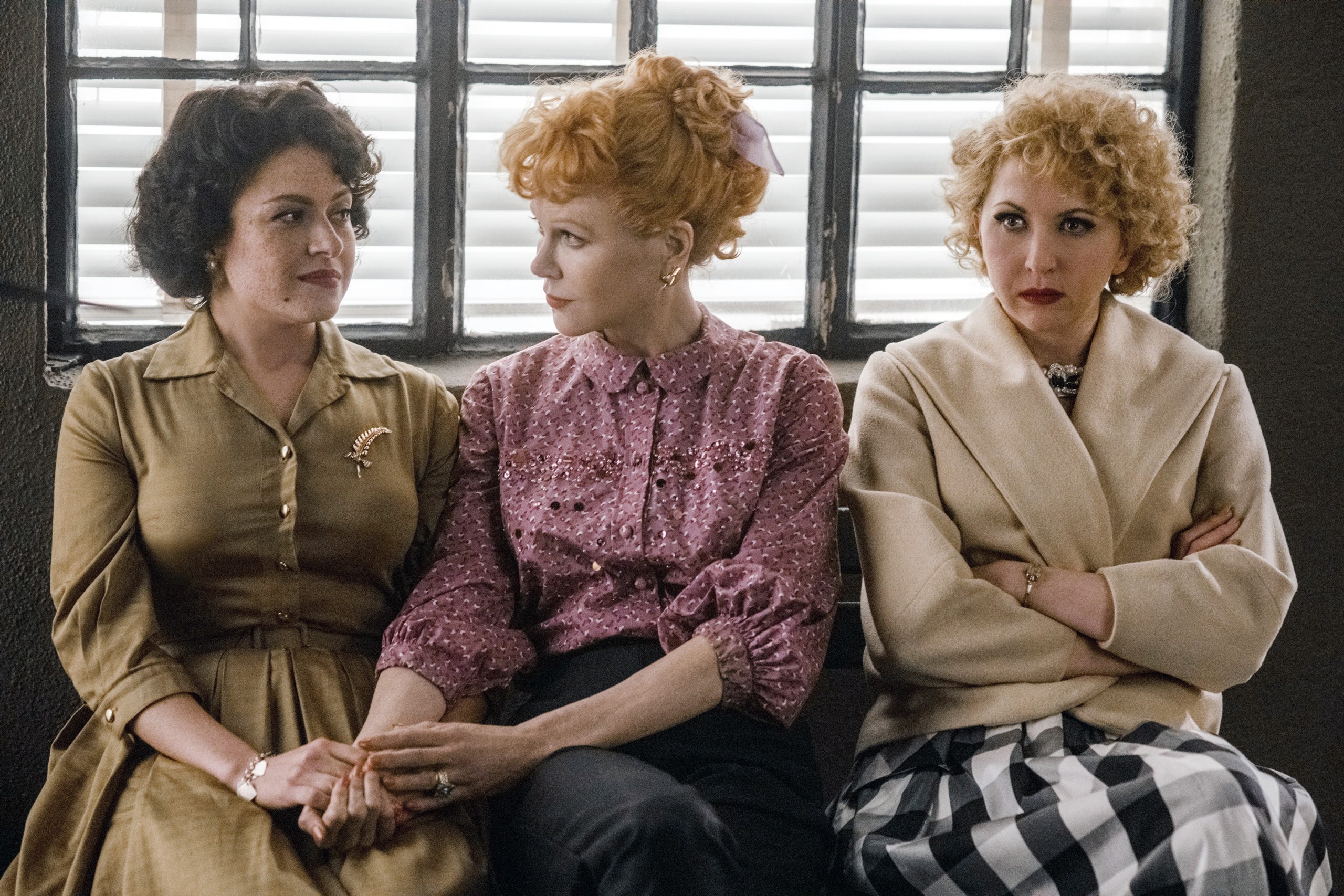Putting the hectoring naysayers to rest, Nicole Kidman proves a terrific Lucille Ball in Aaron Sorkin’s Being the Ricardos, a non-traditional backstage story that gives the star an opportunity to pull off the nifty trick of being both the Lucy Ricardo we know and love, and the woman we don’t know quite as well—the creative mogul behind Desilu, at war with writers, producers, the media and even husband Desi Arnaz, played by a spry Javier Bardem.
Sorkin, who both wrote and directed the film as with last year’s The Trial of the Chicago 7, has crafted a decidedly offbeat biopic in this behind-the-scenes glimpse at a “scary week” during season 2 of I Love Lucy where Ball balances a novice director, on-set creative tensions, accusations of communism and the very real possibility that the tabloids have gotten it right about tomcatting Desi—and that her marriage is about to crumble.
It’s 1953 and the height of success with their smash sitcom when everything threatens to come crashing down after gossip columnist Walter Winchell closes his radio broadcast with the dubious (and false) suggestion that America’s biggest redheaded TV star just might be a Red herself; it doesn’t matter that Ball has a good reason why (as a youngster she checked a “communist” box on a form at a relative’s request without knowing what it meant). Of course, the accusation is what mattered; explanations were irrelevant.
The historic showbiz details in Being the Ricardos are fascinating to see play out, including the first meeting between Ball and Arnaz on the set of the 1940 film adaptation of Rogers and Hart’s Too Many Girls, where she sizes up his lothario manner immediately but falls for him anyway; her excitement at begin cast in a big RKO drama (The Big Street) opposite Henry Fonda after years in chorus and supporting turns, and then being unceremoniously released from her contract; the bickering tensions between Vivian Vance (Nina Arianda) and William Frawley (J.K. Simmons, having crotchety fun); and Ball’s alarm at a slimmed down Vance, whom she’d prefer remain on-camera plump.
Even Ball’s pregnancy and struggles with CBS over its on-air implications have an urgency here, particularly given the tenuous state of the marriage. It’s also fun to explore Ball’s relationship with smart aleck writer Madelyn Pugh, played with zest by Alia Shawkat, the quintessential woman in the room of men, struggling for the funniest voice. All of this is a joy to watch, and Sorkin takes those public record events and effectively bakes them into his drama, structurally cheating a bit in flashback given his desire to frame the picture during a week of crisis. No matter.
Kidman is positively superb and channels both Lucille Ball and Lucy Ricardo with the sort of precision only the most immaculate, detail conscious actors can assume; the black-and-white recreations of famous episodes are particularly uncanny. In a recent press conference the actress described her arduous work capturing Ball’s distinctive voice – her major concern in preparation – and she not only nails Lucy’s high-pitched comedic tone but Ball’s deeper, measured and authoritative cadence.
On that front, Ball is depicted as a creative visionary who knows exactly what will get laughs, often to the consternation of novice director Donald Glass (Christopher Denham) and executive producer Jess Oppenheimer (Tony Hale). Her battles with each remind one of how “difficult women” are perceived in Hollywood – those with instincts that require impromptu 2am rehearsals, who know what works for an audience, who are driven by mad creative genius and who are ultimately proven right.
Kidman will surely be Oscar-nominated for her work, and what a work it is – a vivid illumination of a hard-charging businesswoman and half of a vital creative partnership. At first glace she does not so much look like a dead ringer for Ball, but as the picture settles in the resemblance in gait, gesture, manner and voice is simply transformational.
Bardem has the lesser role and doesn’t quite capture Arnaz’s live-wire comedic spirit (and the film doesn’t ask him to), but he does convey a complex artist and shrewd businessman as equal creative partner. He gets Arnaz’s voice exactly right, and sings in it as well, making something of his own; it is less showy but evocative nonetheless. In the final stretches, he has two terrific moments, one a calculated risk with the audience and other a poignant reckoning involving a handkerchief. The show must go on – in a matter of seconds – even when the show people are falling apart.
Being the Ricardos is richly illuminating, offering a chance to spend time with the people who made the show most of us grew up watching and loving (and still do). Sorkin’s insights, in his often very funny, kinetically wired screenplay, provides a deep window into the marital and creative lives of a pair icons. It’s original and enjoyable.
3 stars.



